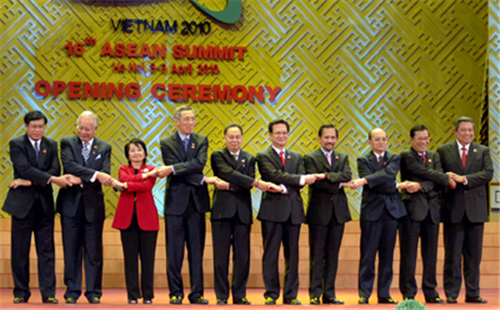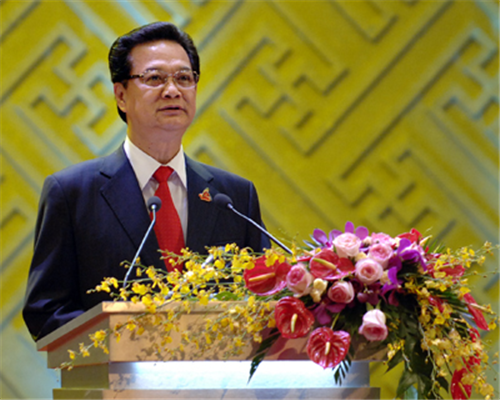After more than four decades of existence and development, ASEAN today has become a closely-integrated political and economic entity, an important player in the region and an indispensable partner of major countries and organizations in the world. The Association has entered a new stage of development, steadily moving towards the realization of the ASEAN Community by 2015 and operating on legal foundation as provided for by the ASEAN Charter.
 |
|
Heads of the delegations to the 16th ASEAN Summit, opened in Ha Noi on April 8, 2010, stand for a group photo
|
The 16th Summit of the Association of Southeast Asian Nations (ASEAN), the first summit in Vietnam’s Chairmanship Year in 2010, opened in Ha Noi today.
The meeting carries an important mandate of setting forth the directions and appropriate solutions to accelerate ASEAN integration and enhance its strength in effectively addressing regional issues as well as global challenges.
After more than four decades of existence and development, has entered a new stage of development, steadily moving towards the realization of the ASEAN Community by 2015 and operating on legal foundation as provided for by the ASEAN Charter. The goal of an ASEAN Community manifests in itself the Member States’ shared vision, earnest desire and strong determination.
In his opening speech, Vietnamese PM Nguyen Tan Dung emphasized that, the most important thing now is to take resolute and strong joint actions, undertake concrete steps and measures to accomplish the set goals and plans our, harmoniously combining national interests with the common ones of the entire region, thus improving the quality of our “unity in diversity.”
The PM proposed that ASEAN leaders should give attention to the following five key issues:
First, according to PM Dung , ASEAN should finalize the related legal documents, improve and enhance the efficiency of ASEAN’s new organizational structure and working method. At the same time, the leaders should provide necessary guidance on the concrete ways and means to accelerate the effective implementation of our agreements on ASEAN Charter Community building, wherein it would be important to promote the “culture of compliance”, strengthen coordination of implementing agencies and the mobilization of resources.
Second, for economic recovery and sustainable development, the Vietnamese PM suggested ASEAN act on three directions: (i) accelerate ASEAN economic integration and work out a suitable model for sustainable economic development; (ii) enhance East Asian economic and financial cooperation, wherein ASEAN plays a central role; and (iii) actively contribute to the common efforts of the international community through the promotion of global solutions.
PM Dung stated that ASEAN should also identify a suitable model to ensure a balanced and sustained development, incorporating economic growth with social development and environmental protection. In this spirit, I propose we consider and adopt a joint statement on recovery and sustainable development, to show ASEAN’s commitment and plan of action.
 |
|
PM Nguyen Tan Dung addresses the opening ceremony of the 16th ASEAN Summit, Ha Noi, April 8, 2010
|
The third issue raised by the Vietnamese PM is to cope with trans-national issues such as climate change, environmental degradation, natural disasters and pandemic. “ASEAN should make greater efforts at both national and regional levels to respond to these challenges, and contribute actively to the common endeavor of the international community,” stressed the PM.
The ASEAN leaders plan to consider and adopt a statement on joint response to climate change, sending out ASEAN’s strong message on the international negotiation process for an effective climate change regime.
Fourth, ASEAN should renew efforts to facilitate dialogue and intensify cooperation on political and security issues; enhance mutual understanding and trust; accelerate the formulation of norms and codes of conducts governing relations amongst countries; maximize the effectiveness and ensure full compliance with existing instruments and mechanisms designed to promote peace and security in the region such as the Treaty of Amity and Cooperation in Southeast Asia (TAC), Southeast Asia Nuclear Weapons Free Zone Treaty (SEANWFZ), Declaration on the Conduct of Parties in the Eastern Sea (DOC), and the ASEAN Regional Forum (ARF); and step up cooperation within ASEAN as well as between ASEAN and its partners in addressing non-traditional security challenges, such as terrorism, trans-national crime, maritime safety and security, among others.
Finally, apart from advancing intra-ASEAN integration, the Association should further consolidate external relations, to mobilize support for ASEAN Community building and enhance its international role and position. Accordingly, it is necessary to strengthen ASEAN+1 cooperation, through enhanced dialogues at all levels, especially at the Leaders’ and Ministers’ levels, and with added substance and efficiency in the implementation of Plans of Action and Joint Statements on comprehensive partnership. We should also promote cooperation through ASEAN-driven frameworks such as ASEAN+3, East Asia Summit (EAS) and ASEAN Regional Forum (ARF). At the same time, we should also take proactive measures to ensure ASEAN’s central role in an evolving regional architecture.
PM Dung concluded his remarks by confirming that during its 15 years of ASEAN membership, Vietnamhas seen impressive national development, rapid regional integration and important contributions to the unceasing growth of the Association.
“We are fully aware that Vietnam is an inseparable part of the ASEAN family and continues to participate in ASEAN cooperation in a proactive and responsible manner to contribute to building a stronger and more closely integrated ASEAN,” said the Vietnamese PM.
During its Chairmanship in 2010, Vietnam will do its utmost and collaborate with other members to achieve concrete results in building the ASEAN Community and properly addressing emerging issues.
The opening ceremony of the 16th ASEAN Summit was followed by a plenary session./.